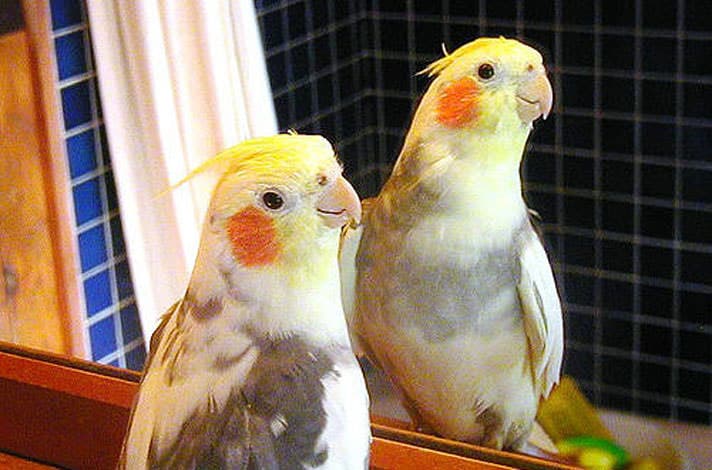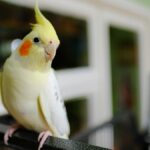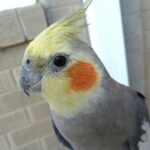Cockatiel Night Frights

Photo by Chewy
Cockatiels seem to suffer from “night frights” more than any other species of bird. By “night fright,” I mean that they become easily spooked or unnerved in the darkness and quiet of the night. Any sort of disturbance, whether it is a shadow, a noise, a bright light or a sudden waft of cool air, can send a single cockatiel or an entire aviary of cockatiels off into a mad frenzy. This is not only distressing and potentially dangerous for the pet birds, but upsetting for the owner, too.
To help understand the psychology of the cockatiel and why it suffers from this heightened unease and trauma, we have to look at the cockatiel in the wild. A wild cockatiel flock spends a good portion of the day on the ground foraging for food. Because of this potentially hazardous practice, nature has had to provide them with the perfect survival technique to enable them to get airborne fast.
Cockatiels possess ultra-quick reactions and a super-efficient capability for rapid and powerful vertical flight. This makes cockatiels well equipped to react to and flee the clutches of predators stalking them on the ground. Even in the wild, a certain level of noise is maintained during the night by the other inhabitants of forests, which offers a degree of comfort to a dozing cockatiel flock. The muted lighting provided by the moon and stars adds to this reassurance.
On such occasions when a “blanket of silence” descends over the area, it often indicates acute danger. A flock of cockatiels will instantly become fearful and anxious, as their responses become intensely heightened. It is not surprising, therefore, that darkness and silence, followed by a sudden disturbance, can seriously spook a cockatiel, too. This is compounded by the fact that pet cockatiels housed in bird cages might feel especially panicky and tormented, because they cannot “escape” this perceived threatening situation, thus sending them into frenzies.
Cockatiels that become spooked are simply responding to their deep-rooted natural instinct to fly upward in an effort to get airborne. But, as a consequence, they often crash into the cage bars at the top, and then flap around wildly, knocking into the perches and sides of the cage in total panic. A cockatiel can see very little in the dark and, while in this state, is likely to do itself much damage. This phenomenon can also cause distress to other birds, such as finches or budgerigars. But, generally they are not affected to the same degree and regularity as cockatiels seem to suffer.
If injuries are incurred, they will serve to intensify the cockatiel’s anxiety and sometimes can even prove to be fatal. If other cockatiels are housed nearby, either indoors or outside, they can suffer from the domino affect; all quickly become panic-stricken, thrashing around in their cages or aviaries, not even knowing the source of the scare.
After The Cockatiel Night Fright
The quickest way to calm a severely stressed, but uninjured, cockatiel in the middle of the night is to turn on the light. Approach the cage calmly, talking to the bird in soothing tones. Remain by its side and talk or sing softly until the cockatiel is gently nudged back to reality and visibly begins to relax.
The sight of a cockatiel in shock can be quite alarming to its owner. Its chest heaves up and down as its heart beats out of control. Its feathers are noticeably fluffed-up, and the bird the bird’s eyes are wide. A bird in this state should not be handled or let out of its cage. Instead it should be quietly left in the cage to fully recuperate from the trauma. If the cockatiel is still obviously suffering from stress in the morning, place its cage in a quiet and warm spot immediately. Offer it a millet spray, moist egg food and plenty of water to encourage it to drink and feed itself.
If A Cockatiel Night Fright Leads To Injury
If a cockatiel is found injured after a particularly horrific episode of night fright, do a “head-to-toe” check. Head injuries are a common occurrence. If the cockatiel is found bleeding from a wound to the cere (where its nostrils are) or from the base of a broken-off or lost blood feather, the flow of blood needs to be halted immediately. A quick way to stem the flow of blood is by dabbing it with a good covering of corn flour or, if not available, flour.
If this action does not halt the bleeding, it is time to seek the assistance of an avian vet. If a cockatiel’s broken-off feather shaft is still intact, it needs to be removed to stop the cockatiel from catching it on the side of the cage or aviary wire, which might cause it to bleed again. Birds cannot afford to lose too much blood; a quarter of a teaspoonful is a lot of blood to a cockatiel.
If you feel confident enough to remove the feather shaft yourself, apply a small pair of pliers to the shaft as near to the skin as possible, while firmly holding down the surrounding area. This is more easily done if someone else is holding the bird while you carry out the procedure. Then, steadily and firmly pull the feather shaft out in the direction in which it was growing. Apply corn flour and then pressure to the area immediately after the shaft’s removal until the flow of blood ceases.
If you are not happy at the thought of carrying out such a procedure, take the cockatiel to an avian vet as quickly as possible for him or her to check the bird over and treat it, as necessary. Cockatiels might accidentally break their wings during a night fright. This can be checked by spreading each wing carefully, or by watching the cockatiel closely to see if it is spreading and stretching each wing as it would normally do. If the wings can be fully extended, with no obvious discomfort to the bird, then the wing is not broken.
Preventative Measures For Cockatiel Night Frights
The best preventative action that can be taken to avoid night fright is to provide low-level lighting at night. Some cockatiel owners find that only partially covering the cage at night, thus allowing some visual light in, also reduces the frequency of night frights. These measures will not guarantee to stop all “traumas of the night” from ever happening again, but they can help pacify a bird when a potentially harmful situation occurs.
The problem lies in the bird not understanding the source of a sudden movement, noise or light. Night fright happens to most cockatiels at some time or other. The best we can do is to put in place as many preventative measures as possible. The more prepared the owner is for such an event, the greater the chance that the bird’s suffering will be minimized, and its recovery will be rapid.
Top 9 Causes For Night Frights
- Nocturnal animals, rodents and insects flitting about in the darkness
- Cats and dogs moving around or suddenly meowing or barking close by
- Shadows moving over the cage or aviary
- A draft or a sudden stream of cool air
- Thunder and lightning
- Fireworks
- Flashing lights, such as those from car headlights
- A member of the household coming in late after everyone else is in bed
- There are also reports of cockatiels thrashing about their cages just moments before an earthquake.
8 Cockatiel Night Fright Prevention Tips
- Do not “plunge” cockatiels into complete darkness at night; provide dimmed lighting.
- Give cockatiels some food or a regular treat about 30 minutes before the lights are dimmed. It gives them something to look forward to at the end of the evening, rather than dread the approach of night.
- Do not cover the cage completely with a “black-out” cloth. A covering on three sides and partially over the top can provide security but still enables them to view their surroundings.
- A baby monitor placed near to the cage and linked to the bedroom can give peace of mind by alerting you to a problem quickly so that you can attend to your cockatiel immediately and defuse the situation.
- Do not move the cockatiel’s cage to an unfamiliar location at night.
- If your cockatiel is being introduced to a new cage or toy, do it at the beginning of the day, so it has maximum daylight hours to become accustomed to it.
- Ensure the curtains in the room are properly closed so light from passing cars don’t spook your pet bird.
- Ensure that your cockatiel is getting adequate sleep and is housed in a peaceful environment
Posted By: Chewy Editorial
Featured Image: Via Jen’s Art & Soul/Flickr



